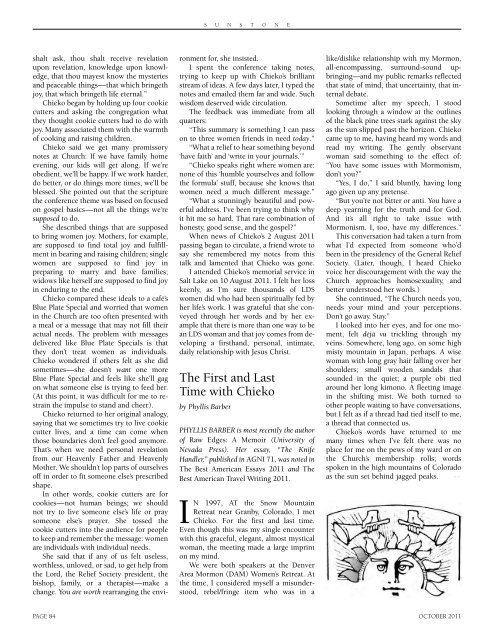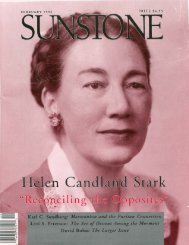Download Entire Issue PDF - Sunstone Magazine
Download Entire Issue PDF - Sunstone Magazine
Download Entire Issue PDF - Sunstone Magazine
Create successful ePaper yourself
Turn your PDF publications into a flip-book with our unique Google optimized e-Paper software.
S U N S T O N E<br />
shalt ask, thou shalt receive revelation<br />
upon revelation, knowledge upon knowledge,<br />
that thou mayest know the mysteries<br />
and peaceable things—that which bringeth<br />
joy, that which bringeth life eternal.”<br />
Chieko began by holding up four cookie<br />
cutters and asking the congregation what<br />
they thought cookie cutters had to do with<br />
joy. Many associated them with the warmth<br />
of cooking and raising children.<br />
Chieko said we get many promissory<br />
notes at Church: If we have family home<br />
evening, our kids will get along. If we’re<br />
obedient, we’ll be happy. If we work harder,<br />
do better, or do things more times, we’ll be<br />
blessed. She pointed out that the scripture<br />
the conference theme was based on focused<br />
on gospel basics—not all the things we’re<br />
supposed to do.<br />
She described things that are supposed<br />
to bring women joy. Mothers, for example,<br />
are supposed to find total joy and fulfillment<br />
in bearing and raising children; single<br />
women are supposed to find joy in<br />
preparing to marry and have families;<br />
widows like herself are supposed to find joy<br />
in enduring to the end.<br />
Chieko compared these ideals to a café’s<br />
Blue Plate Special and worried that women<br />
in the Church are too often presented with<br />
a meal or a message that may not fill their<br />
actual needs. The problem with messages<br />
delivered like Blue Plate Specials is that<br />
they don’t treat women as individuals.<br />
Chieko wondered if others felt as she did<br />
sometimes—she doesn’t want one more<br />
Blue Plate Special and feels like she’ll gag<br />
on what someone else is trying to feed her.<br />
(At this point, it was difficult for me to restrain<br />
the impulse to stand and cheer).<br />
Chieko returned to her original analogy,<br />
saying that we sometimes try to live cookie<br />
cutter lives, and a time can come when<br />
those boundaries don’t feel good anymore.<br />
That’s when we need personal revelation<br />
from our Heavenly Father and Heavenly<br />
Mother. We shouldn’t lop parts of ourselves<br />
off in order to fit someone else’s prescribed<br />
shape.<br />
In other words, cookie cutters are for<br />
cookies—not human beings; we should<br />
not try to live someone else’s life or pray<br />
someone else’s prayer. She tossed the<br />
cookie cutters into the audience for people<br />
to keep and remember the message: women<br />
are individuals with individual needs.<br />
She said that if any of us felt useless,<br />
worthless, unloved, or sad, to get help from<br />
the Lord, the Relief Society president, the<br />
bishop, family, or a therapist—make a<br />
change. You are worth rearranging the environment<br />
for, she insisted.<br />
I spent the conference taking notes,<br />
trying to keep up with Chieko’s brilliant<br />
stream of ideas. A few days later, I typed the<br />
notes and emailed them far and wide. Such<br />
wisdom deserved wide circulation.<br />
The feedback was immediate from all<br />
quarters:<br />
“This summary is something I can pass<br />
on to three women friends in need today.”<br />
“What a relief to hear something beyond<br />
‘have faith’ and ‘write in your journals.’”<br />
“Chieko speaks right where women are:<br />
none of this ‘humble yourselves and follow<br />
the formula’ stuff, because she knows that<br />
women need a much different message.”<br />
“What a stunningly beautiful and powerful<br />
address. I’ve been trying to think why<br />
it hit me so hard. That rare combination of<br />
honesty, good sense, and the gospel?”<br />
When news of Chieko’s 2 August 2011<br />
passing began to circulate, a friend wrote to<br />
say she remembered my notes from this<br />
talk and lamented that Chieko was gone.<br />
I attended Chieko’s memorial service in<br />
Salt Lake on 10 August 2011. I felt her loss<br />
keenly, as I’m sure thousands of LDS<br />
women did who had been spiritually fed by<br />
her life’s work. I was grateful that she conveyed<br />
through her words and by her example<br />
that there is more than one way to be<br />
an LDS woman and that joy comes from developing<br />
a firsthand, personal, intimate,<br />
daily relationship with Jesus Christ.<br />
The First and Last<br />
Time with Chieko<br />
by Phyllis Barber<br />
PHYLLIS BARBER is most recently the author<br />
of Raw Edges: A Memoir (University of<br />
Nevada Press). Her essay, “The Knife<br />
Handler,” published in AGNI 71, was noted in<br />
The Best American Essays 2011 and The<br />
Best American Travel Writing 2011.<br />
IN 1997, AT the Snow Mountain<br />
Retreat near Granby, Colorado, I met<br />
Chieko. For the first and last time.<br />
Even though this was my single encounter<br />
with this graceful, elegant, almost mystical<br />
woman, the meeting made a large imprint<br />
on my mind.<br />
We were both speakers at the Denver<br />
Area Mormon (DAM) Women’s Retreat. At<br />
the time, I considered myself a misunderstood,<br />
rebel/fringe item who was in a<br />
like/dislike relationship with my Mormon,<br />
all-encompassing, surround-sound upbringing—and<br />
my public remarks reflected<br />
that state of mind, that uncertainty, that internal<br />
debate.<br />
Sometime after my speech, I stood<br />
looking through a window at the outlines<br />
of the black pine trees stark against the sky<br />
as the sun slipped past the horizon. Chieko<br />
came up to me, having heard my words and<br />
read my writing. The gently observant<br />
woman said something to the effect of:<br />
“You have some issues with Mormonism,<br />
don’t you?”<br />
“Yes, I do,” I said bluntly, having long<br />
ago given up any pretense.<br />
“But you’re not bitter or anti. You have a<br />
deep yearning for the truth and for God.<br />
And it’s all right to take issue with<br />
Mormonism. I, too, have my differences.”<br />
This conversation had taken a turn from<br />
what I’d expected from someone who’d<br />
been in the presidency of the General Relief<br />
Society. (Later, though, I heard Chieko<br />
voice her discouragement with the way the<br />
Church approaches homosexuality, and<br />
better understood her words.)<br />
She continued, “The Church needs you,<br />
needs your mind and your perceptions.<br />
Don’t go away. Stay.”<br />
I looked into her eyes, and for one moment,<br />
felt déjà vu trickling through my<br />
veins. Somewhere, long ago, on some high<br />
misty mountain in Japan, perhaps. A wise<br />
woman with long gray hair falling over her<br />
shoulders; small wooden sandals that<br />
sounded in the quiet; a purple obi tied<br />
around her long kimono. A fleeting image<br />
in the shifting mist. We both turned to<br />
other people waiting to have conversations,<br />
but I felt as if a thread had tied itself to me,<br />
a thread that connected us.<br />
Chieko’s words have returned to me<br />
many times when I’ve felt there was no<br />
place for me on the pews of my ward or on<br />
the Church’s membership rolls; words<br />
spoken in the high mountains of Colorado<br />
as the sun set behind jagged peaks.<br />
PAGE 84 OCTOBER 2011

















